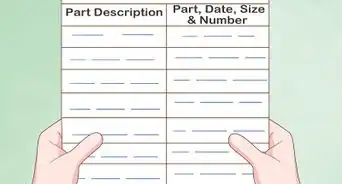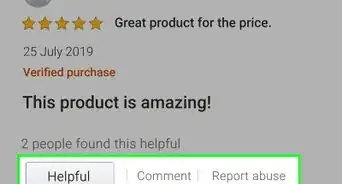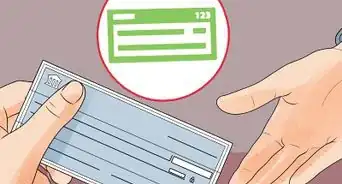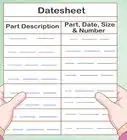This article was co-authored by Clinton M. Sandvick, JD, PhD. Clinton M. Sandvick worked as a civil litigator in California for over 7 years. He received his JD from the University of Wisconsin-Madison in 1998 and his PhD in American History from the University of Oregon in 2013.
There are 7 references cited in this article, which can be found at the bottom of the page.
This article has been viewed 8,292 times.
Typically, when you make a major purchase, the product will come with a warranty from the manufacturer or seller. A warranty is a promise that the manufacturer stands behind its product and will provide some type of coverage should the product be defective or otherwise not meet a certain level of quality and reliability. If possible, when making a large purchase you should review the warranty before you buy the product. You want to evaluate the warranty’s coverage, whether it offers repair or replacement, the reputation of the manufacturer and service provider, and the duration of the warranty.
Steps
Analyzing a Written Warranty
-
1Recognize the requirements of a written warranty. If a manufacturer offers a written warranty, the warranty must comply with federal laws. These laws are meant to protect consumers and ensure that they are able to be educated purchasers. A written warranty must meet the following requirements:
- Written in plain and easily understandable language.
- Provide the name and address of the company giving the warranty.
- Detail the product or parts covered by the warranty.
- Specify whether the warranty provides replacement, repair, or a complete refund.
- Set forth the duration of the warranty, including when the warranty begins.
- Explain any things that the warranty does not cover, such as certain types of damage.
- Describe any dispute resolution procedures.
- Provide information about the consumer’s legal rights.[1]
-
2Read the warranty before you make your purchase. Generally, before making a large purchase, consumers will research the product to determine whether it meets their needs. Consumers should also read the warranties offered with each product that they are considering. Manufacturers provide warranty information online for consumers to review.[2]Advertisement
-
3Determine how long the warranty lasts. When reviewing a warranty, the first thing that you should check is how long the warranty lasts. A written warranty will specify when the warranty begins, which is often the date that you purchase the product. When deciding between different products, consider whether one product has a much longer warranty. This should be a factor in deciding which product to purchase.[3]
- There is no set warranty for all products. You should determine what is the standard warranty for the product you are purchasing.
- You can figure out the standard warranty length by reviewing several different warranties for similar products.
-
4Review the service providers and replacement policies of each warranty. It is important to understand who is responsible for repairing your product should it break while under warranty. You should consider whether it is convenient for you to return the product to a manufacturer or seller. If you have to send the product in for repairs, your warranty should specify who pays for shipping costs. You also want to look closely at how the company will respond if the product breaks. For example, check whether the company repairs the product, replaces it, or refunds your purchase price.[4]
-
5Examine the types of repairs covered by the warranty. The most important part of the warranty is what the warranty actually covers. When comparing different warranties, you want to determine whether the warranty only covers certain types of repairs or parts and if there are any problems that are excluded from coverage. When evaluating a warranty’s coverage, consider the following:
- Would you be required to pay for shipping? This could prove very expensive if the warranty is for a heavy piece of machinery.
- Does the warranty cover “consequential damages,” such as the cost to replace food when the freezer breaks?
- Are there any conditions or limitations on the warranty? Warranties may be void if you fail to use the product as intended or if you attempt to fix the product yourself.[5]
-
6Consider the reputation of the company offering the warranty. You should also look at who is offering the warranty and evaluate whether the company has a good reputation. You can easily search for the company’s name online and look for reviews of its warranty service. If you see repeated complaints about the company, you may want to consider choosing a product with a different warranty service.[6]
- You can check whether any complaints have been filed against the manufacturer or other business offering the warranty at the Better Business Bureau (BBB).[7]
Deciding Whether to Purchase an Extended Warranty
-
1Consider the pros and cons of an extended warranty. When you are making a major purchase, many sellers will also try to sell you an extended warranty, which is also known as a service contract. Unlike warranties that come with the product, you have to pay an additional fee for an extended warranty. It is important to evaluate whether the extended warranty provides you any additional coverage, the extent of that coverage, and weigh the cost of the warranty against the likelihood of repairs.[8]
-
2Assess whether the product will likely need repairs. Before spending a significant amount of money on an extended warranty, you should determine whether it is likely that the product will need to be repaired. Go online and read reviews about the product. If it is unlikely that the product will need to be repaired before you are ready to buy a new product, you should not waste your money on an extended warranty.
- You should also evaluate the cost of typical repairs. If the product may need to be repaired but it is generally not that expensive to repair it, you may want to forego the warranty.
- However, if the repairs tend to be very expensive, you may want to consider purchasing the extended warranty.
- You want to buy a reliable product from a reputable company in order to decrease the likelihood that you will need repairs.[9]
-
3Compare the original warranty and the extended warranty. Before you purchase an extended warranty, you want to make sure that it actually gives you more coverage than the original warranty. Most original warranties last for about twelve months or less. Make sure that the extended warranty begins to run after the original warranty expires.
- If the warranties run at the same time, make sure that the extended warranty provides additional and necessary protection.
- For example, if the original warranty does not cover damage or loss for dropping the product or spilling water on the product, make sure that the extended warranty does, especially if you are prone to dropping or damaging the product.[10]
-
4Weigh the cost of the coverage against the extended coverage. If an extended warranty costs more than 20% of the purchase price of the product, you should consider not purchasing the warranty. If the cost is closer to 50% of the purchase price of the product, you should not purchase the warranty. Most yearlong warranties will cover many of the problems that will arise with a new electronic device. If the product breaks after a year, you may be better off using the money you would have spent on an extended warranty towards the purchase price of a new product.[11]
-
5Know which products should have an extended warranty. While it is important to review the specifics of each extended warranty, there are certain products for which you should be more or less inclined to buy an extended warranty. For example, most expensive new consumer electronics such as stereos, refrigerators, and big-screen televisions are generally reliable and it may not be worth spending money on an extended warranty. However, under certain circumstances you should consider purchasing an extended warranty, such as:
- When you purchase previously owned products, such as a car. There is definitely an increased risk that you will purchase a used car that requires repairs and it may be cost effective to purchase an extended warranty.
- If you buy an older home with dated appliances, you may want to consider purchasing a home warranty. This provides you coverage if anything breaks within the first year or so that you own the home.
- If purchasing an extended warranty will provide you piece of mind after a major purchase, you should consider getting the extended warranty.
- Make sure that you review the warranty coverage and that you don’t pay more than 10 to 20% of the purchase price.[12]
Understanding Different Types of Product Warranties
-
1Recognize an express warranty. An express warranty is made when a seller, manufacturer, or document affirmatively tells you something about the product or promises something about the product when the product is being sold to you. For example, if a seller tells you that you can return something for 60 days for a full refund, this constitutes an express warranty.
- Express warranties can be written or oral. However, oral warranties are much more difficult to prove.
- You may have to show that you relied on the promise when you made the purchase.
- The seller does not have to use the words “promise” or “guarantee” in order to make an express warranty.
- Express warranties may be in the form of an advertisement or certificate that he seller relied on in making the purchase.[13]
-
2Understand implied warranties. In addition to a written or express warranty, almost all consumer products also come with implied warranties. These warranties guarantee that the product is fit for the purpose for which it is being sold and that it will work as the manufacturer or seller claims. There are two common types of implied warranties: the warranty of merchantability and the warranty of fitness for a particular purpose.
- The warranty of merchantability means that the product will do what the seller or manufacturer says it will do. For example, a toaster will toast bread.
- The warranty of fitness for a particular purpose applies if you rely on the seller’s advice when purchasing a product for a particular use. For example, if you explain that you need a bike rack to hold two mountain bikes and the seller tells you that a particular rack will work with you car, then you have an implied warranty of fitness for a particular purpose.
- You should be aware that some sellers will sell products “as is” to avoid making any implied warranties.
- However, certain states such as Kansas, Maine, Maryland, Massachusetts, Mississippi, Vermont, West Virginia, and the District of Columbia, do not allow “as is” sales.[14]
-
3Consider lifetime warranties. When purchasing a product, the claim that it comes with a “lifetime warranty” may be very appealing to you. However, lifetime warranties rarely live up to what their name suggest. When reviewing a lifetime warranty, it is important to read the fine print that comes with the warranty. This will tell you how long a “lifetime” under the warranty actually lasts and what parts of the product are actually covered.
- Some lifetime warranties only cover the product for as long as the item is being sold and the warranty ends when the product is discontinued.
- Some lifetime warranties are limited to certain parts, a certain period of time or to certain types of damage.
- Some lifetime warranties are limited to defects but do not include normal wear and tear.[15]
References
- ↑ http://consumer.findlaw.com/consumer-transactions/consumer-warranty-basics.html
- ↑ https://www.consumer.ftc.gov/articles/0252-warranties
- ↑ https://www.consumer.ftc.gov/articles/0252-warranties
- ↑ https://www.consumer.ftc.gov/articles/0252-warranties
- ↑ https://www.consumer.ftc.gov/articles/0252-warranties
- ↑ https://www.consumer.ftc.gov/articles/0252-warranties
- ↑ https://www.bbb.org
- ↑ https://www.consumer.ftc.gov/articles/0240-extended-warranties-and-service-contracts
- ↑ https://www.consumer.ftc.gov/articles/0240-extended-warranties-and-service-contracts
- ↑ http://money.usnews.com/money/personal-finance/articles/2013/12/19/when-you-should-and-shouldnt-buy-an-extended-warranty?page=2
- ↑ http://money.usnews.com/money/personal-finance/articles/2013/12/19/when-you-should-and-shouldnt-buy-an-extended-warranty?page=2
- ↑ http://money.usnews.com/money/personal-finance/articles/2013/12/19/when-you-should-and-shouldnt-buy-an-extended-warranty?page=2
- ↑ http://www.nolo.com/legal-encyclopedia/the-ucc-sales-contract-warranties.html
- ↑ https://www.consumer.ftc.gov/articles/0252-warranties; http://www.nolo.com/legal-encyclopedia/the-ucc-sales-contract-warranties.html
- ↑ http://consumer.findlaw.com/consumer-transactions/consumer-warranty-basics.html


































































